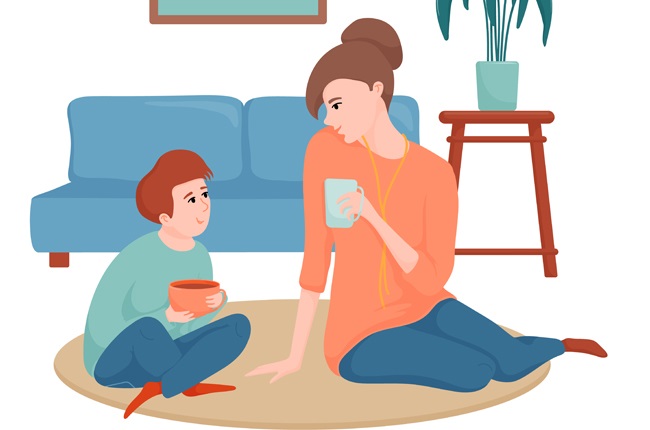
- Child and adolescent mental health problems are on the rise, according to research.
- As a caregiver, it's important to be able to recognise the signs of distress in children and respond with support and resources.
- You also need to know how to talk to children about mental health.
Emerging research suggests that child and adolescent mental health problems are on the rise. For example, one in four children report that they have experienced clinically elevated rates of depression, and rates of emergency department visits for attempted suicide have increased by 22 per cent in the past few years.
As clinicians and researchers, we have interacted with thousands of caregivers, many of whom have asked us how they can better understand and support their children’s mental health.
Below we offer a step-by-step guide for recognising the signs of mental distress and responding with support and resources to help foster recovery and resilience in children and adolescents.
READ MORE | Mental health: almost half of Joburg students in new study screened positive for probable depression
Recognise signs of distress
Children and adolescents have varying reactions to experiences and events, and signs of mental distress can look different across young people (and can look different compared to adults too). Changes are normal in children and adolescents, but dramatic and sustained changes are not. Typically, caregivers should be on the lookout for a combination of:
Increased distress, such as more sadness, irritability, worry, or risk-taking.
Changes in daily functioning, such as changes in sleep, eating, physical activity, energy levels and/or interests, which may be subsequently impacting their peer or family relationships, extracurriculars or academic performance.
READ MORE | How to talk about dying: 'Having things in place can help the people grieving the loss'
Talk to your children about mental health
We encourage caregivers to have conversations about mental health early and often, whether their child or teen is struggling or not. This helps to normalise the conversation and supports children and adolescents in knowing they can go to you when they are struggling.
Conversations are especially important when children or adolescents appear to be struggling. You can start by letting them know you care, and then pointing out what you have observed in terms of changes in their distress and daily functioning, such as “I’ve noticed that you’ve been sleeping a lot more than usual. Have you noticed these changes too?” Then ask if you can talk about this further together to deepen the conversation.
If you feel that strategy won’t work for your child, or if you often get answers of “fine” to “how are you feeling?”, try the third person strategy, which can reduce distress during tense conversations.
In this scenario, make a statement about children’s mental health generally, such as “I hear there’s a lot of kids and teens struggling with their mental health right now” and then ask open-ended questions, such as: “what do you think about that?” or “what have you noticed about your own mental health lately”?
When you have conversations about mental health with your child or adolescent, try to minimise any potential discomfort. It’s best to find a time that works well for your child. For example, when they are rested, fed, and relaxed.
Also, some children find it hard to have face-to-face conversations about their mental health. If this is the case with your child or adolescent, you could ask them to go for a walk and start the conversation then or when you are doing something else, like loading the dishwasher or driving to an extracurricular activity. This can take the pressure off what might be perceived as stressful face-to-face conversations.
When children and adolescents do open up, express empathy for what they are going through, using phrases such as “that sounds really difficult” and/or “I understand how painful that can be.” Often as caregivers, we want to jump into problem-solving mode, but the most effective approach to supporting children and adolescents is often to listen and validate their feelings and/or distress.
Communicating and connecting with children and adolescents, and confirming they have our support, can foster resilience in times of adversity.
Express empathy for what children and adolescents are going through. This video discusses empathy and sympathy.
Talk with their teacher
If you remain concerned about your child, and want to gather additional information, you could speak with their teacher or guidance counsellor. Up to 80 per cent of children get their knowledge about mental health from schools. Guidance counsellors are specifically trained to address mental health concerns and other school staff are used to having conversations about mental health with students. They typically welcome these conversations with caregivers.
Teachers can also provide a valuable perspective on how a child’s mental health may have changed, and what might be precipitating these changes. For example, children may be experiencing learning struggles or bullying, which they haven’t yet disclosed to you, but is causing them some distress. Guidance counsellors and teachers can also help brainstorm ideas for building up children’s coping strategies and supporting their success at school.
If possible, have your child join these conversations, so they feel involved in discussions about their own mental health and develop agency in addressing it.
READ MORE | Anxious, irritable or sad: Experts say these signs may mean it's time to speak to a therapist
Talk with your health-care provider
Health-care providers are trained in evaluating mental and physical health problems alike. They can formally screen and assess for mental health problems by asking the caregiver and child questions about changes in mood, behaviour and functioning and matching symptoms of distress and impairment with “diagnostic criteria” for various mental health disorders.
With this knowledge, health-care providers can offer strategies and resources to support children and caregivers. They will work with caregivers and children directly to decide on the best approaches to addressing the child’s mental health struggles.
It is also important to let children and adolescents know of other services they can access for support, such as Kids Help Phone, which is available via text or phone 24/7.
Immediately address urgent mental health problems
The strategies above can occur when children and adolescents are not in immediate danger. But when your child shows warning signs of suicide, or is engaging in self-harm behaviour, get them help as soon as possible, including:
Taking them to the nearest acute care hospital.
If your child will not go to the hospital or you’re unsure if this is the right thing to do, get help from a health-care provider as quickly as possible. You can call the health-care team or a crisis line.
If your child is attempting or about to attempt suicide, do not leave them alone, and call emergency services immediately.
Although supportive in nature, taking care of our children’s mental health can also be taxing and/or triggering for many caregivers. To best support children and adolescents, we also need to take care of ourselves. We encourage caregivers to prioritise their own mental health, so that they can feel energised and empowered to attend to their children’s mental health.
Sheri Madigan, Professor, Canada Research Chair in Determinants of Child Development, Owerko Centre at the Alberta Children’s Hospital Research Institute, University of Calgary and Tracy Vaillancourt, Tier 1 Canada Research Chair in School-Based Mental Health and Violence Prevention, L’Université d’Ottawa/University of Ottawa
This article is republished from The Conversation under a Creative Commons license. Read the original article.




 Publications
Publications
 Partners
Partners












